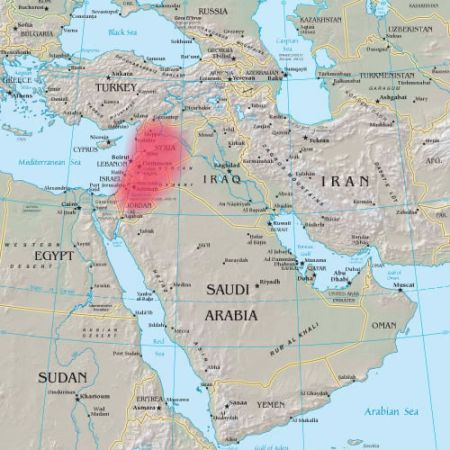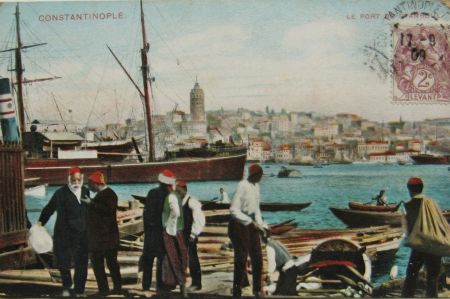Levante - Land of the Sunrise in near East
- Written by Portal Editor
A term that appears in some of our articles and should now finally be clarified, because Levante comes from the Italian meaning "sunrise" and is therefore roughly equivalent to the term "morning land".
At the time of the Roman Empire, now 2000 years ago, the region of the eastern Mediterranean, and consequently all of today's countries east of Italy, were considered to belong to the Levant. At that time, these were in particular the Greek peninsula with all the scattered Aegean islands, the Mediterranean coastal area of today's Turkey, Cyprus, Lebanon, Palestine, historical Syria and Egypt.
Again and again one hears the term Levant in connection with the so-called Neolithic Revolution, the period of human development history when itinerant gatherers and hunters became sedentary farmers who were engaged in grain cultivation and animal husbandry. Scholars are still arguing to this day as to whether this was solely due to climatic changes and the absence of large groups of gazelles, or whether it was a matter of genetic changes in the genetic makeup of the hunter-gatherers, who were now able to tolerate dairy products. The term "Fertile Crescent" is also used again and again in connection with the Levant, although the Neolithic revolution also took place particularly in the river areas of the Euphrates and Tigris, i.e. in Mesopotamia. Some of the oldest urban cultures in the world later arose here. In general, the term Neolithic Revolution is somewhat misleading, which we associate with a sudden change. Today it is assumed that this revolution from collectors and hunters to farmers lasted about 5000 years and began around 15,000 - 20,000 BC.
Today's states of Syria, Lebanon, Israel, Jordan and the autonomous Palestinian territories.
 This immense period of time, which can really be described as a revolution from the point of view of the overall development of the earth and human life, is still considered little researched and therefore unknown. It is true that the excavations at Göbeklitepe, which date back to around 12,500 BC, clearly shed new light on human settlement history, but much is still completely unknown. And far worse: Mankind continues to destroy its own history through wars and bombs, because in the narrower sense the geographical term includes the Levant coasts and hinterland of the countries bordering the eastern Mediterranean coast, i.e. today's states of Syria, Lebanon, Israel, Jordan and the Palestinian autonomous areas.
This immense period of time, which can really be described as a revolution from the point of view of the overall development of the earth and human life, is still considered little researched and therefore unknown. It is true that the excavations at Göbeklitepe, which date back to around 12,500 BC, clearly shed new light on human settlement history, but much is still completely unknown. And far worse: Mankind continues to destroy its own history through wars and bombs, because in the narrower sense the geographical term includes the Levant coasts and hinterland of the countries bordering the eastern Mediterranean coast, i.e. today's states of Syria, Lebanon, Israel, Jordan and the Palestinian autonomous areas.
From a European point of view, the Levant was of particular importance due to the intensive trade relations with the Italian city-states, which had already been established with the Byzantine Empire and even the Seljuks before the Crusades in the early Middle Ages. In the Ottoman Empire, all Roman Catholic Christians were considered Levantines. The Levant was an important transshipment point for oriental goods, which were brought in via the Indian Ocean and the Asian caravan routes (Silk Road) and which were exchanged for European products such as cloths and fabrics. Levantine trade contributed significantly to the wealth of cities like Marseille and Livorno, or city-states like Genoa and Venice, but was severely disrupted by the encroachment of the Ottoman Empire, as the Ottomans imposed trade bans in the mid-15th century. With the opening of new sea routes in the 15th and 16th centuries, the economic importance of the Levant decreased sharply.
In Italian, "il levantino" also means "cunning person".
In Europe they even had special terms for people who came from the region mentioned: Levantino. As late as the 19th century, someone of mixed European-Oriental origin was considered a Levantine. People who were born and raised there, perhaps descendants of Europeans and Oriental mothers (or vice versa), often played a special role in the socio-economic history of the then trading cities of the Orient. Merchants were considered mediators between the Orient and Europe and have always been cunning. Maybe that's why the term Levantino is still valid today, because in Italian "il levantino" also means "cunning person".
Please read as well:
Devil's Cave near Pottenstein in Franconian Switzerland
Königsburg ruins and Königshütte waterfall - stamps 41 and 42
